Location Based Marketing
Location Based Mobile Marketing: Benefits & Challenges
Wed, 26 Jun 2024 12:17:38 GMT
Speak to our Hyperlocal Expert
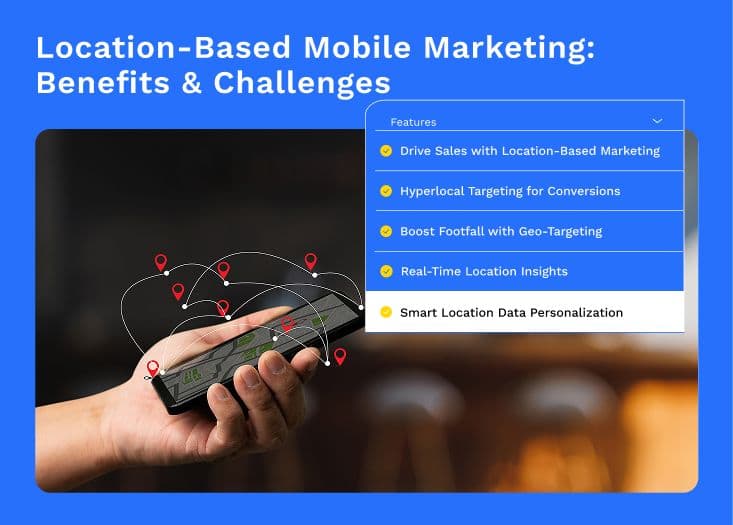
Editor’s Note: This post was originally published in June 2024 and was updated in Dec 2025 for accuracy and comprehensiveness.
Location-based mobile marketing is an effective marketing strategy that is used by many nearby businesses to notify device owners (via SMS) about an offer based on their location. It aims to capture users’ attention and turn them into customers.
Almost 1/3 of our mobile searches are related to location. Many times, we tag photos on social media to share cool places we have visited. We also check in at our favorite coffee shop. We share our location with restaurants to get food delivered.
Location-based mobile marketing is becoming increasingly popular among marketers to reach customers and generate more sales. Thus, if you want your business to succeed, you have to use location based mobile marketing techniques. The purpose of this article is to explain everything you need to know to get started with it.
What Is Location-Based Mobile Marketing
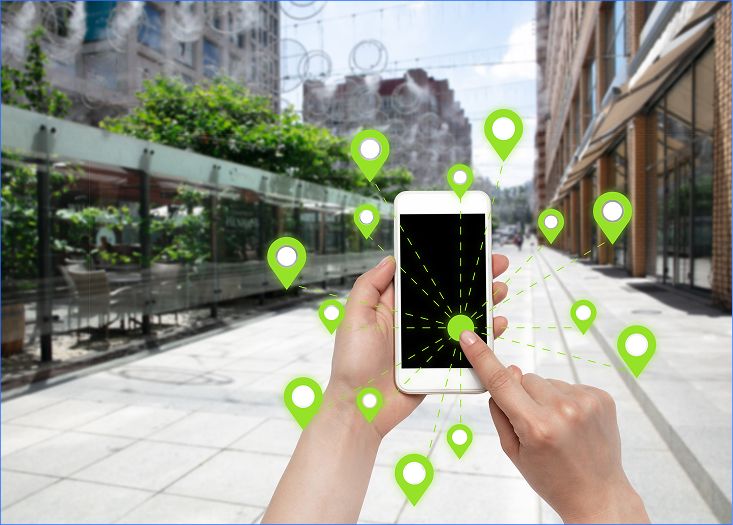
In location based mobile marketing, different techniques are used to target users based on their location. Geofencing, geo conquesting, and proximity marketing are the most common ones. In addition to GPS, IP addresses, and beacons, each of these techniques uses various technologies to target users. Automated messages and advertisements are triggered when users are near a particular location.
The goal of location based mobile marketing is to capture users’ attention and turn them into customers. The ads you use are tailored to the users’ location and will appear on their smartphones or tablets. Your chosen audience will receive notifications. In addition, location-based ads may appear when a user conducts a “near me” search.
Discover the essentials of location-based mobile marketing in 2025 and learn how businesses can connect with consumers at the right place and time. This guide explains the strategies, tools, and techniques to engage your audience effectively. "What Is Location Based Marketing in 2023: A Complete Guide"
Essential Types of Location-Based Mobile Marketing for Businesses
1. Geo-Targeting
Deliver location-based mobile marketing messages based on country, city, or ZIP code to reach the right audience. Sekel Tech’s Customer Data Platform helps segment and target users effectively.
2. Geofencing
Trigger notifications when customers enter or exit a defined area. Boost store visits and engagement with Digital Campaign Management from Sekel Tech.
3. Proximity Marketing
Use beacons or NFC to detect nearby users and send personalized offers, guiding them through the buying journey. Sekel Tech’s CRM helps track and follow up with these users.
4. Geo-Conquesting
Target users near competitor locations with tailored promotions, gaining a competitive advantage.
5. Mobile Check-Ins & Social Location Marketing
Encourage store check-ins or social engagement to boost brand awareness and gather insights on footfall and preferences.
Read Also: Best Location Based Marketing Tools for Your Brand in 2024
Top Benefits of Location-Based Mobile Marketing
Today, businesses need smarter ways to connect with customers on their mobile devices and that’s exactly where location based mobile marketing becomes incredibly powerful. Since people rely heavily on their phones, brands need strategies that reach them at the right place and time. With these location-driven mobile marketing techniques, companies can deliver more relevant messages, improve engagement, and drive better conversions. Here are some of the most impactful benefits.
1. Mobile Personalization
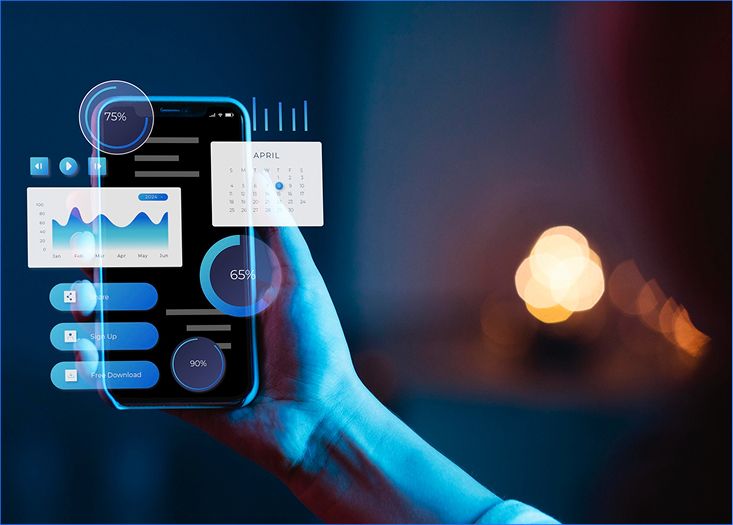
One of the biggest strengths of location-based mobile marketing is how personalised and timely it can be. When messages are customised based on a user’s interests and their real-time location, they feel far more relevant. Most consumers prefer content tailored to their needs, and with location-aware marketing, brands can offer timely recommendations or push notifications that genuinely add value.
2. Target the Right Audience

With location based mobile marketing, reaching the right audience becomes easier and more precise. Using technologies like GPS and Bluetooth, businesses can send location-specific messages to users who are nearby or within a chosen radius. This ensures people receive information that matters to them, improving the impact of your mobile campaigns.
3. Track User Activity
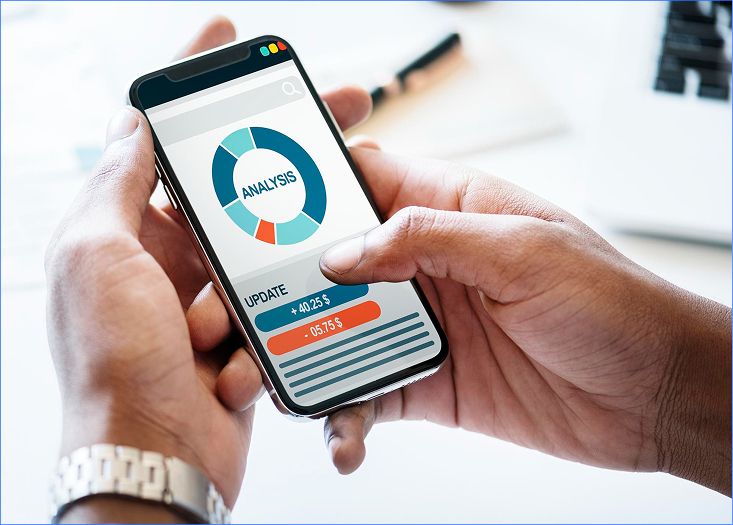
Another key advantage of location-based mobile marketing is the ability to track and understand user behaviour in real time. Brands can instantly see which notifications were opened, how many users visited a webpage, or whether a specific location-triggered offer led to action. These insights help refine campaigns and improve decision-making.
4. Instant Results

Because smartphones are always within reach, location based mobile marketing enables brands to deliver messages at the perfect moment. Whether users are near your store, conducting a "near me" search, or browsing on the go, your message can reach them when they’re most likely to take action. This fast and context-aware communication drives quicker responses and higher engagement.
Read Also: How Effectiveness of Location-Based Marketing Improves O2O
Learn how to implement location-based marketing campaigns that target customers in real time. See practical examples of geofencing, geo-targeting, and proximity marketing to boost engagement and drive sales. "Location-Based Mobile Marketing: How to Reach Consumers at the Right Place and Time"
Challenges of Location-based Mobile Marketing
1. Privacy Issues
Privacy concerns remain one of the biggest barriers in location based mobile marketing. With regulations like GDPR and CCPA evolving, brands must ensure strict data protection and offer transparent opt-out options. When customers feel in control of their data, they are more willing to engage with mobile location based marketing campaigns.
2. Measuring Success
Tracking the real impact of location-based mobile marketing can be challenging. A push notification or geo-targeted alert does not always guarantee action. While metrics like message opens or app usage help, they don’t show the full picture. Using in-app analytics, purchase tracking, and campaign attribution tools helps measure whether your location driven campaigns contribute to revenue and ROI.
3. Non-Segmented Targeting
Relying only on broad geo-fencing, location targeting, or mobile location targeting often leads to wasted budgets. Just because people are present in a nearby area doesn’t mean they are the right audience. It’s more effective to segment users into smaller groups using geo-targeting, behavioural filters, and interest-based criteria. This helps eliminate irrelevant audiences and boosts the efficiency of your location based mobile advertising.
4. Building an Effective Strategy
Creating a strong strategy for mobile location marketing can feel complex. Start by understanding how your audience uses mobile devices. Analyse customer behaviour, review competitor approaches, and map audience segments. Building buyer personas based on mobile habits helps tailor campaigns that resonate. Research-driven insights make your location based mobile marketing strategy more impactful and relevant.
Location-Based Mobile Marketing: Key Trends Shaping the Industry
- AI-driven Predictive Targeting: Anticipate customer needs and deliver personalised messages at the right time, making location based mobile marketing campaigns more effective.
- Hyperlocal Personalisation: Tailor content based on users’ exact locations to boost engagement and conversion rates.
- 5G-Enabled Real-Time Campaigns: Reach customers instantly on mobile devices, enhancing responsiveness and timely interactions.
- Privacy-First Marketing: Focus on secure, compliant campaigns that build trust while respecting user data.
- Retail Footfall Tracking & Analytics: Measure store visits and campaign impact to optimise strategies and maximise ROI.
Successful Tips & Real-World Examples for Location Based Mobile Marketing
1. Location-Based Mobile Marketing Using Geo-Targeting
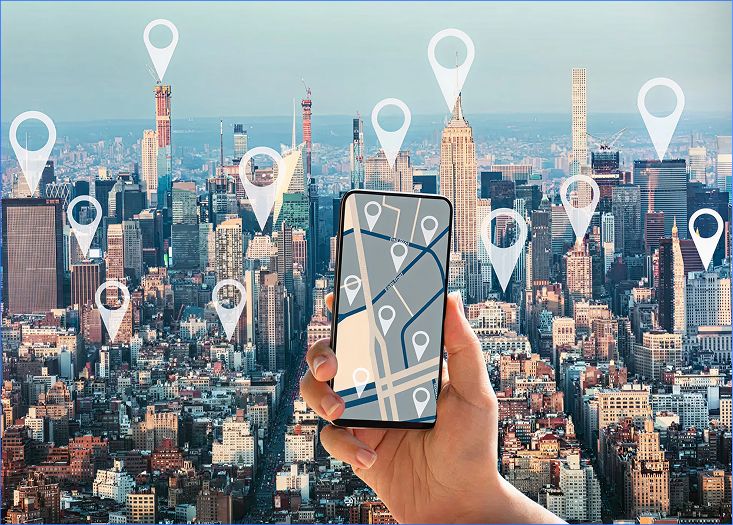
Location based mobile marketing becomes more effective when paired with geo-targeting, which uses IP, Wi-Fi or GPS to deliver region-specific messages. This approach helps brands appear in relevant local searches, improve customer engagement and strengthen visibility across nearby digital touchpoints. When supported by tools like a Store Locator or Store Microsites, it enhances discovery and drives better results.
Example: A search for “jewellery shops in Hadapsar, Pune” shows optimized stores at the top because they’ve tailored their presence for local intent - showing how geo-targeting supports powerful location-based mobile marketing outcomes.
2. Make Your Location-Based Mobile Marketing Effective with Geofencing
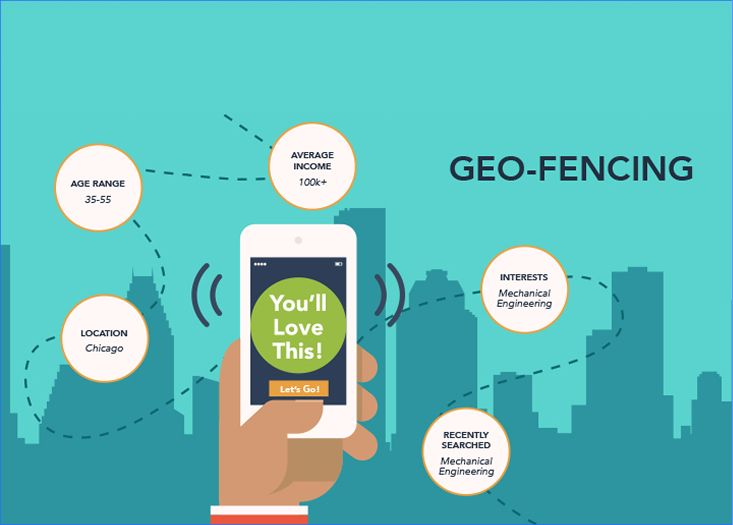
Geofencing is another strong technique within location-based mobile marketing. It uses mobile apps or software to send automated alerts when a user enters or exits a predefined area. Powered by GPS, RFID, Wi-Fi or mobile data, geofencing enables real-time engagement and helps brands deliver instant, high-intent messaging. When combined with a Customer Data Platform (CDP), segmentation becomes more accurate and impactful.
Example: A foodie walking near a Haldiram outlet receives a push notification. This timely message, triggered through geofencing, demonstrates how real-time mobile location targeting can influence a customer decision instantly.
3. Use Geo-Conquesting to Stay Ahead of Competitors

Geo-conquesting takes location based mobile marketing a step further by targeting customers near competitor locations. Using mobile location data, brands can push personalised offers, highlight better deals or promote unique value to win footfall. Insights from tools like Review Management further strengthen competitive positioning.
Example: Bridgestone used geo-conquesting to outsmart competitors, achieving a 50% higher CTR through strategic, location-driven targeting.
4. Proximity-Based Mobile Marketing for Instant Conversions
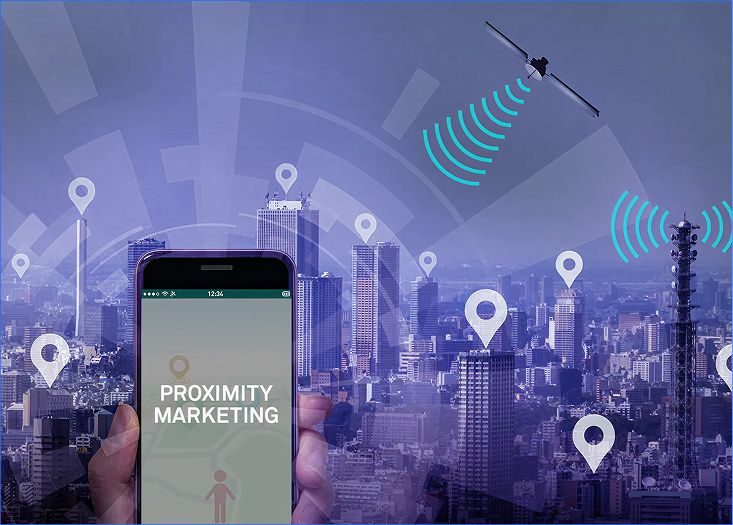
Proximity marketing is a more precise form of location-based mobile marketing, using Beacons or NFC to detect users at very close distances. It helps brands deliver hyper-relevant messages based on real-time behaviour and past interactions. This makes the customer journey smoother - from discovery to conversion and retention.
Example: Proximity targeting identifies users near a VLCC centre and triggers personalised prompts - such as skincare offers or appointment reminders - guiding them through the buying process and creating stronger engagement.
Read Also - Best Location-based Mobile Marketing Examples That Worked
Frequently Asked Questions (FAQs)
1. What is Location-Based Mobile Marketing?
Location-based mobile marketing is a type of mobile marketing that uses the location of a mobile device to deliver targeted, location-specific content and offers to consumers. This can be done through various methods, including GPS, Bluetooth beacons, and Wi-Fi.
2. How Effective is Location-Based Marketing?
Location-based marketing can be very effective when used correctly. By targeting advertisements and promotions to people in specific geographic locations, businesses can increase the relevance and usefulness of their marketing efforts. This can lead to higher engagement and conversion rates, as well as more foot traffic to physical storefronts.
3. What is the Future of Location Based Marketing?
Using location-based marketing has become increasingly popular over the past few years, allowing businesses to reach out to customers who are on the go. Big brands are expected to adopt location-based marketing this year, and social media giants will invest heavily in it.
4. What are the advantages of location based marketing?
Location-based marketing offers several advantages, including increased engagement with customers and higher conversion rates. It also allows businesses to target specific audiences based on their location, making it easier to reach customers with tailored, relevant messages.
5. What do you mean by location in marketing?
In marketing, location means using a customer’s real-time place to deliver relevant, timely messages. With location based mobile marketing, brands use GPS or Wi-Fi signals to personalise content, connect online intent with nearby stores, and improve local engagement.
6. What is an example of location-based data?
Location-based data includes information that shows a user’s real-time position - for example, GPS coordinates, mobile device signals, or Wi-Fi/Bluetooth proximity data. Brands use this to power smarter location-based mobile marketing campaigns.
Conclusion
Regardless of how big or small your business is, location based mobile marketing can transform your business. When you send users personalised offers based on their location, conversions and revenue increase. It is not a problem for users to share their location if they get something valuable in return for sharing information about their location. People want relevant content tailored to their needs, and they don’t mind sharing their location. To increase revenue and conversions, use location-based mobile marketing techniques such as geo-targeting, geo-fencing, and proximity marketing.
Take Advantage of Sekel Tech’s Location-Based Mobile Marketing
If you’re looking for a way to advertise your business locally, location-based marketing is an extremely effective tool. It’s most effective at boosting in-store traffic and brand awareness. As compared to other advertising methods, it is also relatively cost-effective.
With Sekel Tech’s location-based marketing, you can build awareness and trust with customers and increase conversions and profits. To compete with your competitors, you can not only deliver personalised messages to your potential customers, but also create location-based marketing campaigns. You can turn impulses into sales through Sekel Tech’s platform by bringing customers into your store physically.
The location-based mobile marketing platform from Sekel Tech allows you to interact with your customers via email, social media, web, and mobile. With it, you can automate and manage every campaign, publish content, analyse results, and optimise as you go.
Read More Blogs -
1. What Is Location Based Marketing in 2025: A Complete Guide
2. How Location Based Marketing Works & 5 Proven Ways to Do It
3. 10 Location based Marketing Strategies to Compete in 2025
Share
Similar Blogs
Loved this content?
Sign up for our newsletter and get the latest tips & updates directly in your inbox.
There’s more where that came from!